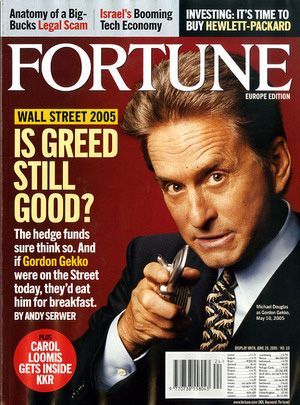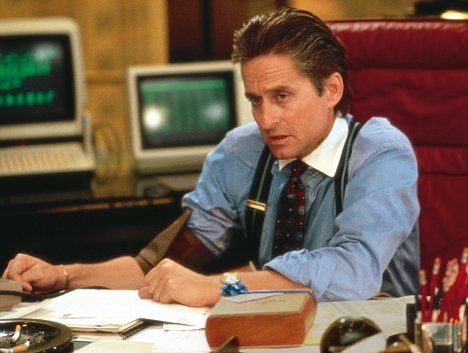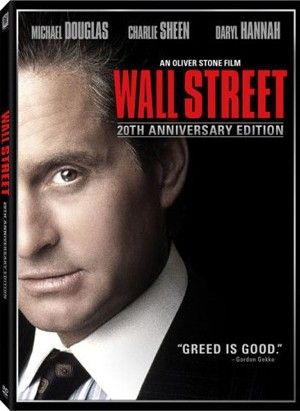
Publisher:
Bonnie King
CONTACT:
Newsroom@Salem-news.com
Advertising:
Adsales@Salem-news.com

~Truth~
~Justice~
~Peace~
TJP
Jul-31-2011 14:10

 TweetFollow @OregonNews
TweetFollow @OregonNews
The Wit and Wisdom of Gordon Gekko
By Daniel Johnson, Associate Editor, Salem-News.com“You’re all pretty much f*cked. You don’t know it yet, but you’re the Ninja generation—no income, no job, no assets.
 Michael Douglas as Gordon Gekko; a fictional movie character he played- for which he won the best actor Academy Award. |
(CALGARY, Alberta) - Gordon Gekko is a fictional movie character played by Michael Douglas (a role for which he won the best actor Academy Award). At the end of the first movie, in 1987, Bud Fox (Charlie Sheen) has turned him in for insider trading and the viewer is left with the impression that GG will go to jail. It’s 1993 before he “actually” does and he is in for almost eight years—released just after 9/11.
While in prison he writes a book, Is Greed Good? Speaking to a large audience on a book tour he begins, with no preamble:
“You’re all pretty much f*cked. You don’t know it yet, but you’re the Ninja generation—no income, no job, no assets. You got a lot to look forward to. Someone reminded me the other evening, that I once said “greed is good”. Now it seems it’s legal.
“But folks, it’s greed that makes my bartender buy three houses he can’t afford, with no money down. It’s greed that makes your parents refinance their $200,000 house for 250, and they take that extra 50 and they go down to the mall and they buy a plasma TV, cell phones, computers, an SUV and hey, why not a second home while we’re at it, cause gee whiz, we all know that the prices of houses in America always go up, right?
“And it’s greed that makes the government in this country cut the interest rates to one percent after 9/11 so you can all go shopping again.

“They’ve got all these fancy names for trillions of dollars of credit: CMOs, CDOs, SIVs, ABSs; you know I honestly think that there’s maybe, only seventy-five people in the world who know what they are. Well, I’ll tell you what they are. They’re WMDs, weapons of mass destruction, that’s what they are.
“When I was away, the greedy got greedier, with a little bit of envy mixed in. Hedge funders were walking home with $50, $100 million bucks a year. So, Mr. Banker looks around and says ‘my life looks pretty boring’ so he starts leveraging his interest to 40 to 50 to 1. With your money! Not his. Yours. Because he could. You’re supposed to be borrowing, not them. And the beauty of the deal, no one is responsible. ‘Cause everybody’s drinking the same Kool-Aid.
“Last year, ladies and gentlemen, 40% of all American corporate profits came from financial services. Not production, not even remotely to do with the needs of the American public. The truth is we’re all part of it now. Banks, consumers, they’re moving money around in circles. We take a buck, we shoot it full of steroids and we call it leverage. I call it steroid banking. I was a pretty smart guy when it came to finance and maybe I was in prison too long, but sometimes it’s the only place to stay sane and look out through those bars and say, Hey! Is everybody out there nuts?
“It’s clear as a bell to those who pay attention. The mother of all evil is speculation. Leveraged debt. Bottom line is borrowing to the hilt and I hate to tell you this, but it’s a bankrupt business model. Won’t work. It’s systemic, malignant and it’s global. Like cancer. It’s a disease and we gotta fight back. How we gonna do that? How we gonna leverage that disease back in our favour? Well, I’ll tell you. Three words. Buy my book!”
I quote a lot from novels and movies because they are an increasingly legitimate way in today’s society to broadcast social commentary. Gordon Gekko is a fictional character, but what we’re hearing is not fictional; they are the words composed by the screen writers and their directors. They’re just expressing their ideas in a forum publicly different than a newspaper or magazine piece.

I learned this truth from the 1991 movie Grand Canyon starring Steve Martin (Davis), Kevin Kline (Mack) and Danny Glover. Steve Martin is a movie producer and Kline, an immigration lawyer, is his best friend. Davis tells Mack about the movie Sullivan’s Travels (1941):
“It's a story about a guy, he's a filmmaker like me, who loses his way, and forgets what it was he was set on earth to do. Fortunately, he finds his way back. It can happen, Mack. Check it out. That's part of your problem: you haven't seen enough movies. All of life's riddles are answered in the movies.”
It was this last sentence that resonated with me. It’s not what movies say, but it’s what the writers say using a movie character as a vehicle. It’s the same with novels. You have to separate the wisdom from the entertainment.
There was some prescience in Grand Canyon. Davis was shot during a robbery and he says to Mack:
“The point is there's a gulf in this country; an ever-widening abyss between the people who have stuff, and the people who don't have shit. It's like this big hole in the ground, as big as the f*cking Grand Canyon, and what's come pouring out is an eruption of rage, and the rage creates violence, and the violence is real, Mack. Nothing's gonna make it go away, until someone changes something, which is not going to happen. And you may not like it, even I may not like it, but I can't pretend it isn't there because that it is a lie, and when art lies, it becomes worthless. So I gotta keep telling the truth, even if it scares the shit out of me, like it scares the shit out of you. Even if it means some motherf*cker can blow a big hole in my leg for a watch, and I'm gonna walk with a f*cking limp for the rest of my life and call myself lucky.”

This takes us to Gekko’s mini-speech in Wall Street (1987). Bud Fox is becoming disillusioned and Gekko says:
“The richest one percent of this country owns half our country's wealth, five trillion dollars. One third of that comes from hard work, two thirds comes from inheritance, interest on interest accumulating to widows and idiot sons and what I do, stock and real estate speculation. It's bullshit. You got ninety percent of the American public out there with little or no net worth. I create nothing. I own. We make the rules, pal. The news, war, peace, famine, upheaval, the price per paper clip. We pick that rabbit out of the hat while everybody sits out there wondering how the hell we did it. Now you're not naive enough to think we're living in a democracy, are you buddy? It's the free market. And you're a part of it. You've got that killer instinct. Stick around pal, I've still got a lot to teach you.”
These moviemakers, through their characters, are not saying anything different than what the financial press acknowledges, except that most people don’t read the financial press except as that information is filtered through small-town newspapers and TV news—neither type of source giving them an inkling of a larger picture.
Throughout history empires have risen, dominated the known world, then fallen or faded away. Britain, not that long ago, was the greatest country in the world. They lost that status over just a couple of decades. The United States, participating in the flow of history, is now in its own state of decline. This was predicted by Abraham Lincoln a century and a half ago:
“A nation divided against itself cannot stand.
As Senator Joseph S. Clark (D. Pennsylvania) noted in the 1960s:
“Our forms of government are heavily weighted against any kind of action, and especially any that might alter significantly the status quo. It takes too many units of government to consent before anything can be done.”
Ferdinand Lundberg added: “The constitutional bulwarks against tyranny, placed there by the Founders’ hands, are used to produce a creeping, low-key tyranny.”
This is tragically enumerated in a July 26 New York Times editorial saying that the Republicans “have lost sight of the country’s welfare…”
“This increasingly reckless game has pushed the nation to the brink of ruinous default. The Republicans have dimmed the futures of millions of jobless Americans, whose hopes for work grow more out of reach as government job programs are cut and interest rates begin to rise. They have made the federal government a laughingstock around the globe”.
This, however, is the way the American political system was set up. As Peter Baker wrote in the New York Times:
“Is this any way to run a country? As it happens, yes. Ideal it is not. Inspiring, hardly at all. But the fractious, backbiting, finger-pointing, polarizing, partisan, kick-the-can-down-the-road brinkmanship of Washington politics these days is, let’s face it, the reality of American governance in the modern era. For all the hand-wringing about how the system is broken, this is the system as it was designed and is now adapted for the digital age. All the high-minded vows to put politics aside for the greater good ignore the fact that the system is built on politics, with the idea that politics, however ugly, eventually can produce a greater good, however imperfect”
Here’s where the rubber meets the road for the American people. The American empire is over, even though it will take another decade or two for it to be official. Like it or not, China is rising. They currently hold more than a trillion dollars of American debt.
The main impetus for the decline is that America has been a fantasyland, well before Walt Disney set it up and charged admission. Over the last couple of years a common theme among commenters dissing me is a belief in America’s exceptionalism and that America has been down before, and will rise again. The source of optimism is a mystical belief, like magic, in the Constitution. But it is the Constitution itself that doomed the American enterprise from the start.
Overall, I'm just surprised that Chinese language studies are not noticeably in more demand across the country.
 Daniel Johnson was born near the midpoint of the twentieth century in Calgary, Alberta. In his teens he knew he was going to be a writer, which is why he was one of only a handful of boys in his high school typing class — a skill he knew was going to be necessary. He defines himself as a social reformer, not a left winger, the latter being an ideological label which, he says, is why he is not an ideologue. From 1975 to 1981 he was reporter, photographer, then editor of the weekly Airdrie Echo. For more than ten years after that he worked with Peter C. Newman, Canada’s top business writer (notably on a series of books, The Canadian Establishment). Through this period Daniel also did some national radio and TV broadcasting. He gave up journalism in the early 1980s because he had no interest in being a hack writer for the mainstream media and became a software developer and programmer. He retired from computers last year and is now back to doing what he loves — writing and trying to make the world a better place
Daniel Johnson was born near the midpoint of the twentieth century in Calgary, Alberta. In his teens he knew he was going to be a writer, which is why he was one of only a handful of boys in his high school typing class — a skill he knew was going to be necessary. He defines himself as a social reformer, not a left winger, the latter being an ideological label which, he says, is why he is not an ideologue. From 1975 to 1981 he was reporter, photographer, then editor of the weekly Airdrie Echo. For more than ten years after that he worked with Peter C. Newman, Canada’s top business writer (notably on a series of books, The Canadian Establishment). Through this period Daniel also did some national radio and TV broadcasting. He gave up journalism in the early 1980s because he had no interest in being a hack writer for the mainstream media and became a software developer and programmer. He retired from computers last year and is now back to doing what he loves — writing and trying to make the world a better place
Articles for July 30, 2011 | Articles for July 31, 2011 | Articles for August 1, 2011


googlec507860f6901db00.html


Salem-News.com:
Terms of Service | Privacy Policy
All comments and messages are approved by people and self promotional links or unacceptable comments are denied.
COLLI August 1, 2011 8:02 am (Pacific time)
Dan: Wow . . . you can really find and tickle a sore-spot. The problem is that so much of what you say is absolutely true. Your opinion of how it will all end is also too believeable as the pending agreement on raising the debt limit of the U.S. proves. The fact that there has been no tax increase for the richest 1% is obvious as is the total failure to cap future spending. It is all a farce meant to pull even more wool over the eyes of the citizens of the U.S. and the world. All political parties are complicit or agreement would never have been reached Dan. Entering a voting booth in the U.S. has become reaching into a pocket that has a rattlesnake, a copperhead, and a cotton-mouth moccassin in it. People know they are going to get bitten but are glad to know the snakes that will bite them have anti-venom for sale. The problems are (1) The mega-world banks that run the federal reserve, (2) the political parties owned and run by the mega-world banks, (3) Sheeple who feel that reading, investigating, and analyzing information about those who would be our leaders is too much trouble, and (4) failure to initiate and use the recall mechanism . . . again, too much trouble and too few honest politicians.
[Return to Top]©2026 Salem-News.com. All opinions expressed in this article are those of the author and do not necessarily reflect those of Salem-News.com.